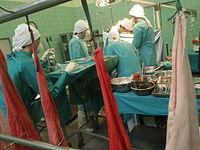
Photo from wikipedia
Kidney transplantation improves quality of life, prolongs survival, and is cost-effective, but bears some serious complications including malignancy. The aim of this study was to assess the prevalence of malignancy… Click to show full abstract
Kidney transplantation improves quality of life, prolongs survival, and is cost-effective, but bears some serious complications including malignancy. The aim of this study was to assess the prevalence of malignancy in dialyzed patients on the waiting list and in kidney allograft recipients. The cross-sectional study was conducted in 50 prevalent patients on the waiting list and 300 kidney allograft recipients. Patients who had been registered in the cadaver kidney waiting list and kidney allograft recipients did not differ in regard to age, sex, dialysis vintage, and causes of end-stage renal failure. In waitlisted patients, only 3 had a history of malignancy. In kidney allograft recipients, 52 patients developed malignancy. The leading malignancy was skin cancer with 9 cases, followed by post-transplant lymphoproliferative disorder in 5 cases, Kaposi sarcoma in 2 cases, brain cancer in 2 cases, Merkel carcinoma in 2 cases, lung cancer (small cell and non--small cell), unknown origin in 2 cases, and the other 22 malignancies were in single patients (including 1 leukemia and 1 multiple myeloma). Seventeen deaths were recorded in kidney allograft recipients with malignancy mainly in post-transplant lymphoproliferative disorder, Kaposi sarcoma, Merkel carcinoma, sarcoma, and brain cancer. Concluding, waitlisted patients represent a very selected and healthier dialyzed population. Guidelines for cancer screening in both potential transplant recipients and kidney allograft recipients should be developed as nowadays a scarcity of data exists in this matter. Minimization of immunosuppressive regimen should be considered, in particular, in high-risk patients.
Journal Title: Transplantation proceedings
Year Published: 2020
Link to full text (if available)
Share on Social Media: Sign Up to like & get
recommendations!